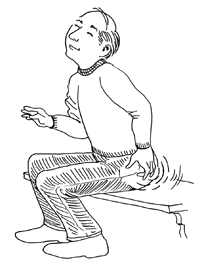STRANGE BUT TRUE- Rubbed raw: Chronic itching no laughing matter

DRAWING BY DEBORAH DERR McCLINTOCK
Q. How bad can the "chronic itching syndrome" get? H. O. Psoriasis
A. This is actually surprisingly widespread, affecting hundreds of millions worldwide, a result of scabies, eczema, kidney or liver disease, HIV, infectious illnesses, drug reactions, says Greg Miller in the journal Science. For reasons not well understood, itching can occur over large swaths of the body or be concentrated on the face, back, etc. And when it strikes, it can increase mortality rates, probably due to severe sleep loss.
One grisly case involved a Bostonian after a shingles outbreak: Her rash cleared up, but not the itch, which led her to scratch so much that emergency room doctors discovered brain tissue protruding through a hole she had worn in her skull!
While an itch used to be regarded as "pain's little brother," today the two are believed to "talk independently to the brain." Some substances such as morphine may actually dull pain but trigger itching as a side effect, while others reduce itching without quieting pain. Yet to be studied: Why is scratching an itch so addictive? It feels bodily rewarding, which may also help explain its contagiousness: Just seeing someone else go at it can set off your own episode, as can reading a Q&A on the subject.
Q. Is it more brains or brawn that leads some birds to a life of crime? –A. Hale
A. A big-brained body seems to do it, says S. Milius in Science News magazine. Julie Morand-Ferron of the University of Quebec in Montreal and colleagues checked out hundreds of scientific reports of bird-on-bird food snatching; she herself also observed Carib grackles in Barbados sneaking dry dog food out of unattended bowls, then deftly swiping pellets from each other. Of the 9,672 known bird species, some two percent have "criminal" records, including families of falcons, eagles, and pelicans that tend to go after sizeable meals such as an already captured fish or mouse.
Such "kleptoparasitism" may involve acrobatic midair grabs, zigzaggy chases, or harassment of successful hunters until some of the booty is regurgitated for the thief. Roseate terns use outright trickery to rob larger species and each other: One tern flirted with fish-carrying males only long enough to sidle up and grab their food. Yet these tern thieves are "far and away the best parents." Said one Iowa researcher, "It can give you a new respect for kleptoparasites."
Q. When the weather gets you down, would it be more correct to say you're "not feeling so good" or "not feeling so well"? Feeling "bad" or "badly"? –J. Brown
A. The issue here, as you good (adjective) grammarians well (adverb) know, is the discriminating use of adjectives and adverbs; or you might say, using your adjectives and adverbs well (adverb), says Mark Davidson in Right, Wrong, and Risky: A Dictionary of Today's American English Usage. If you feel good, that can mean you're in a good mood or in good health. But you might as well restrict feeling good to mood, because feeling well is restricted to health.
You might do well in English class but not good, because well is an adverb. You might also feel good about your doing well in English. When advertisers are doing well (adverb) by doing good (noun), they're perhaps profiting from joining forces with environmentalists (doing a good deed). But, sympathetic you, shouldn't say you feel badly (adverb) because people are losing their jobs, unless this somehow throws off the neurology of your feeling fingertips. Even if all of this is bad (adjective) stuff to deal with, let's hope you handle it well and feel good about doing so.
Q. Why are there so many different toothpastes on the market? I. Pana
A. Because toothpaste as advertised has a lot of work to do, such as preventing cavities, whitening teeth, freshening breath, cleaning sensitive teeth, and there's even a liver-flavored variety for dogs, says Simon Quellen Field in Why There's Antifreeze in Your Toothpaste.
Toothpastes need to have abrasives to scour off bacterial film, fluoride to harden the teeth against decay, thickeners to help squeeze the stuff out of the tube and stay on the brush, strong and pleasant flavors to mask the bad taste of decaying bits of food as well as the awful taste of other ingredients like detergents and phosphates. Detergents are used to remove any fatty film, plus water softeners make the detergent work better. This also helps clean the teeth and provides a foam to carry away debris. The list goes on, such as sequestering agents, sulfates for dissolving plaque, baking soda for "mouth feel."
The aforementioned "antifreeze" is typically glycerin or propylene glycol, safe and edible in small doses, with a moisturizing effect to keep the toothpaste from drying out when the cap is left off. "However, if it's diethylene glycol, the toxic ingredient found in a car's radiator, you do have a problem," Field says.
Send Strange questions to brothers Bill and Rich at [email protected].
#